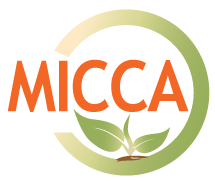The Mitigation of Climate Change in Agriculture (MICCA) global program


Overall program overview
The Mitigation of Climate Change in Agriculture (MICCA) Programme, which is carried out by the Food and Agriculture Organization (FAO) of the United Nations is formed by a set of Pilot Projects operating in four countries including Kenya, Tanzania, Vietnam, and Ecuador. Each pilot project has a particular focus. Overall, the main MICCA Programme goal is to facilitate developing countries in contributing to the mitigation of climate change in agriculture and moving towards low carbon emission agriculture. MICCA is working with national and international partners to carry out a set of pilot projects designed to integrate climate-smart practices into existing smallholder agricultural development activities. Pilot projects are being chosen which focus on those agricultural activities that tend to have high emissions as well as high potential for their reduction. MICCA is implementing two pilot projects in Eastern Africa in collaboration with the World Agroforestry Centre (ICRAF), CARE International and the East Africa Dairy Development Project (EADD) led by Heifer International. The pilot project in Tanzania is implemented within the framework of the Hillside Conservation Agriculture Project (HICAP) by CARE International in the Uluguru Mountains and promotes conservation agriculture and agroforestry.
The pilot projects pertain to the wider MICCA programme whose objective is to support developing countries contributing to climate change mitigation in agriculture by moving towards climate smart agricultural practices and policies. A variety of activities are promoted under this umbrella to support policy and decision making, as well as to provide input to the international negotiations on climate change. MICCA develops a database on greenhouse gas emissions for agricultural activities to provide comparable global and country-level data and builds the capacity at country level for reporting on emissions. Life-cycle analysis to quantify greenhouse gas emissions from the entire agricultural production chain are carried out and a methodology has been developed to calculate how much greenhouse gases are emitted along the entire production chain for products such as milk, meat and eggs. The pilot projects are putting climate-smart agriculture into practice. Globally, agriculture contributes approximately 13% of the greenhouse gas emissions, but many of the emissions in the forestry sector (17%) are caused by land use change through agricultural activities, promoting degradation and causing deforestation. Thus, agriculture is linked to about 30% of the global emissions (IPCC< 2007). However, agriculture is also very susceptible to climate change and many smallholders world-wide are already facing its impacts on their livelihoods and their agricultural production. Climate-smart agriculture tries to respond to these challenges and aims to support food security through implementing practices which improve productivity and at the same time increase the resilience of the farming system. When implementing practices which improve the adaptive capacity, mitigation co-benefits can also be generated. This means that an overall decrease in greenhouse gas emissions or an increase in carbon sequestration occurs, therefore the overall greenhouse gas balance of the farming system is improved.
Click on the pilot sites below to find out more:
- MICCA Tanzania (Article | Placemark)- a partnership between FAO, ICRAF and CARE Tanzania.
- MICCA Kenya (Article | Placemark)- a partnership between FAO, ICRAF and Heifer International.
(0) Comments
There is no content